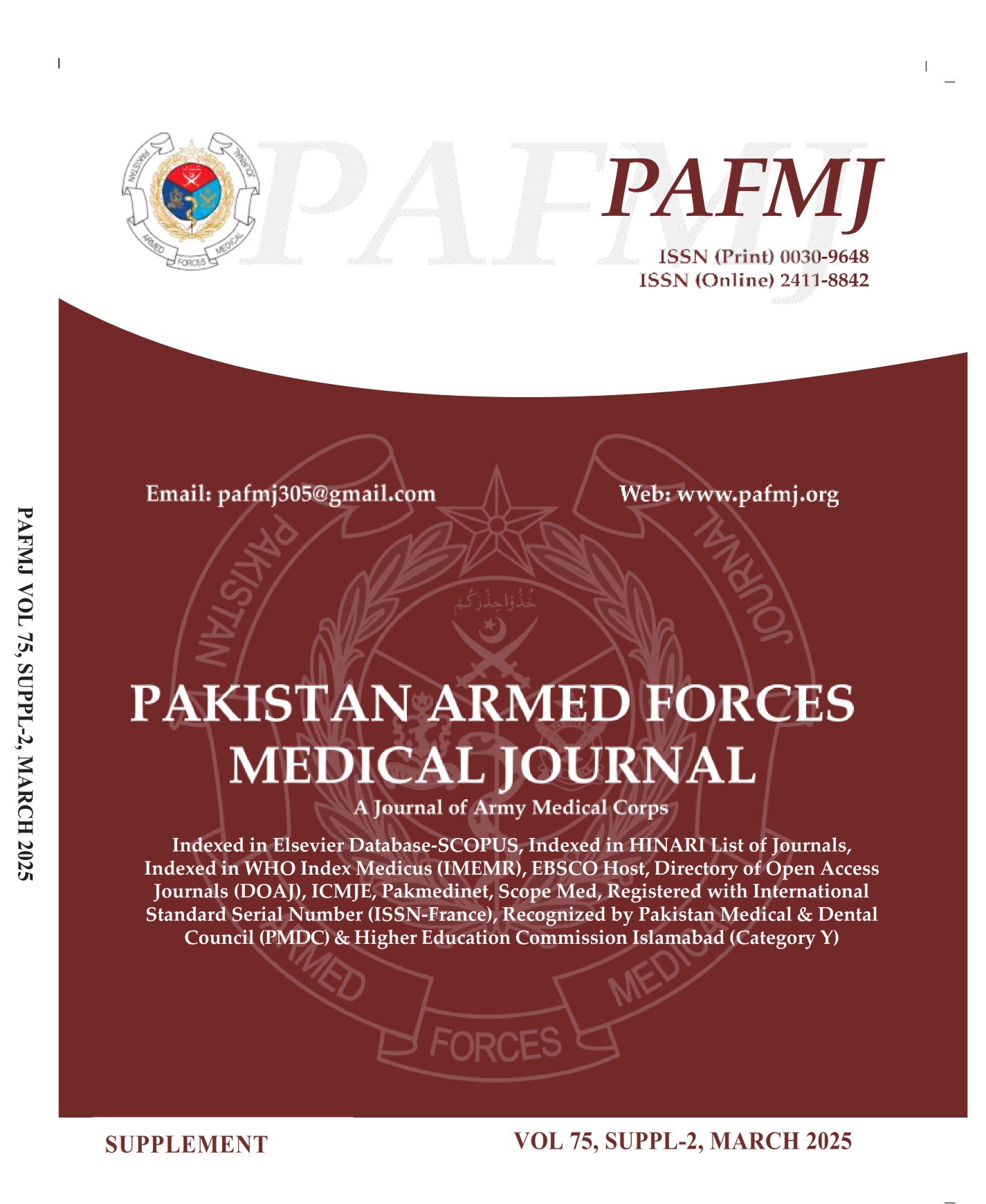The High Cost of a Medicalized Death: Are We Heading in the Right Direction or Is It Time for a Change?
DOI:
https://doi.org/10.51253/pafmj.v75iSUPPL-2.13327Abstract
The medicalization of death refers to the process by which dying is increasingly viewed and treated as a medical issue, often leading to interventions that may not align with patients' desires or values.1 This phenomenon has been shaped by historical, cultural, and systemic factors, resulting in a healthcare model that prioritizes hospital-based care at the end of life.2,3
Every year, millions of people spend their final days in hospitals, hooked to machines and surrounded by strangers, rather than at home with loved ones. This is the reality of medicalized death—a phenomenon that prioritizes aggressive interventions over patient autonomy and dignity. Some people have argued that medicalization can provide necessary support and pain management for patients at the end of life, ensuring comfort and dignity. This perspective emphasizes the role of medical professionals in facilitating a "good death" through appropriate interventions.4 This editorial highlight the issue of medicalization in context of a developing country like Pakistan with limited resources and some possible solutions.
Downloads
References
Lantz PM, Goldberg DS, Gollust SE. The Perils of Medicalization for Population Health and Health Equity. Milbank Q 2023; 101(S1): 61-82. https://doi.org/10.1111/1468-0009.12619
Field D. Palliative medicine and the medicalization of death. Eur J Cancer Care (Engl) 1994; 3(2): 58-62. https://doi.org/10.1111/j.1365-2354.1994.tb00014.x
Van Dijk W, Faber MJ, Tanke MA, Jeurissen PP, Westert GP. Medicalisation and Overdiagnosis: What Society Does to Medicine. Int J Health Policy Manag 2016; 5(11): 619-622. https://doi.org/10.15171/ijhpm.2016.121
Koksvik GH, Richards N, Gerson SM, Materstvedt LJ, Clark D. Medicalisation, suffering and control at the end of life: The interplay of deep continuous palliative sedation and assisted dying. Health (London) 2022; 26(4): 512-531. https://doi.org/10.1177/1363459320976746
Munshi A, Garg R. The Medicalization of Menopause: Understanding the Evolution of Treatment Approaches. J Midlife Health 2024; 15(3): 133-134. https://doi.org/10.4103/jmh.jmh_153_24
Garber J.The medicalization of death: What does it mean and what can we do about it? Available at: https://lowninstitute.org/how-death-becamemedicalized-and-what-we-can-do-about-it
Niino Y. The increasing cesarean rate globally and what we can do about it. Biosci Trends 2011; 5(4): 139-150. https://doi.org/10.5582/bst.2011.v5.4.139
Visser GHA, Ubom AE, Neji K, Nassar A, Jacobsson B, Nicholson W, et al. FIGO Childbirth and Postpartum Hemorrhage Committee*. FIGO opinion paper: Drivers and solutions to the cesarean delivery epidemic with emphasis on the increasing rates in Africa and Southeastern Europe. Int J Gynaecol Obstet 2023; 163(2): 5-9. https://doi.org/10.1002/ijgo.15111
Akdeniz M, Yardımcı B, Kavukcu E. Ethical considerations at the end-of-life care. SAGE Open Med 2021; 9: 20503121211000918. https://doi.org/10.1177/20503121211000918
Hannig A. Demedicalising dying: medicine must accept death as a natural part of life. BMJ 2024; 387:q2703. https://doi.org/10.1136/bmj.q2703
Angus DC, Barnato AE, Linde-Zwirble WT, Weissfeld LA, Watson RS, Rickert T, et al. Robert Wood Johnson Foundation ICU End-Of-Life Peer Group. Use of intensive care at the end of life in the United States: an epidemiologic study. Crit Care Med 2004; 32(3): 638-643. https://doi.org/10.1097/01.ccm.0000114816.62331.0
Mahara G, Tian C, Xu X, Wang W. Revolutionising health care: Exploring the latest advances in medical sciences. J Glob Health 2023; 13: 03042. https://doi.org/10.7189/jogh.13.03042
Gellie A, Mills A, Levinson M, Stephenson G, Flynn E. Death: a foe to be conquered? Questioning the paradigm. Age Ageing 2015; 44(1): 7-10. https://doi.org/10.1093/ageing/afu116
M.R. Rajagopal MR, Rattanani J. The medicalisation of death: Isolation of the dying is cruel. https://www.southasiamonitor.org/perspective/medicalisation-death-isolation-dying-cruel
Abdullah R, Guo P, Harding R. Preferences and Experiences of Muslim Patients and Their Families in Muslim-Majority Countries for End-of-Life Care: A Systematic Review and Thematic Analysis. J Pain Symptom Manage 2020; 60(6): 1223-1238.e4. https://doi.org/10.1016/j.jpainsymman.2020.06.032
Sutherland R. Dying Well-Informed: The Need for Better Clinical Education Surrounding Facilitating End-of-Life Conversations. Yale J Biol Med 2019; 92(4): 757-764.
Keeley MP. Family Communication at the End of Life. Behav Sci (Basel) 2017; 7(3): 45.
Downloads
Published
Issue
Section
License

This work is licensed under a Creative Commons Attribution-NonCommercial 4.0 International License.















